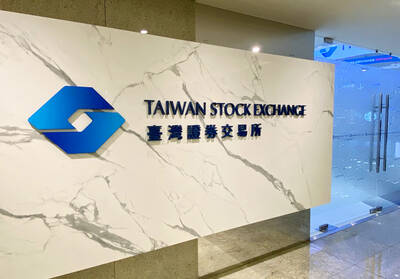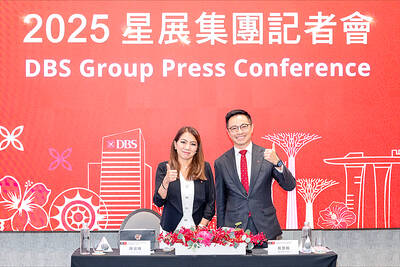Industrial computer maker Advantech Co (研華科技) yesterday said it would stick to its goal of growing annual revenue by a double-digit percentage this year after reporting 7.97 percent annual growth in revenue for the first half of the year.
“Given [rising] demand from China, North America and Europe, we are confident that revenue growth momentum in the first half of this year can carry into the remainder of this year,” Advantech investor relations manager Jill Su (蘇智蘋) said in a teleconference.
Daiwa Capital Markets Inc cut its forecast for Advantech’s revenue growth in the second half of this year from the previous estimate of 20 percent annual growth to 13 percent to 14 percent growth from last year’s NT$17.24 billion (US$543.76 million), citing weaker client demand.
“We still expect this year’s overall sales growth to be more than 10 percent from last year, but the overall demand for Advantech’s products has become more volatile, as its clients tend to postpone shipments of orders until the last minute,” Daiwa analyst Christine Wang (王琦清) said in a note released on Thursday last week.
Advantech reported net income of NT$2.53 billion, or NT$4.01 per share, in the first six months of this year, up 7.2 percent from NT$2.36 billion made in the same period last year, driven mainly by demand from North America and China, the firm said last week.
Consolidated revenue in the first half of the year grew by 7.97 percent to NT$18.81 billion from last year’s NT$17.42 billion, Advantech said.
“We are not happy with the results for the first half of this year, as the results were only ‘acceptable’ to Advantech… We will work harder to accelerate growth in the second half of this year,” company president Chaney Ho (何春盛) said.
Despite trimming expected revenue growth in the second half of this year, Wang said she maintains the “hold” rating on Advantech’s stock, as it reflects Daiwa’s positive view on the industrial computer maker’s competitive advantage in Internet of Things applications.
As part of its efforts to be more focused on Internet of Things business opportunities, Advantech announced in the teleconference that it plans to initiate a corporate restructuring plan.
“We will combine and restructure Advantech’s seven main business units into three main units: industrial Internet of Things, smart city solutions and embedded design-in for industrial computers,” Ho said.
Ho said the firm expects growing demand for transportation, retail and wholesale, healthcare and industrial automation in the manufacturing sector over the next few decades, and Advantech has drafted a long-term strategy to catch the potential business.
Advantech aims to grow its market share and secure its leading position in the industrial computer industry, and will seek revenue and profitability growth through strategic alliances with software integrators for specific industries, such as for the transportation industry, Ho said.

Taiwan Semiconductor Manufacturing Co (TSMC, 台積電) secured a record 70.2 percent share of the global foundry business in the second quarter, up from 67.6 percent the previous quarter, and continued widening its lead over second-placed Samsung Electronics Co, TrendForce Corp (集邦科技) said on Monday. TSMC posted US$30.24 billion in sales in the April-to-June period, up 18.5 percent from the previous quarter, driven by major smartphone customers entering their ramp-up cycle and robust demand for artificial intelligence chips, laptops and PCs, which boosted wafer shipments and average selling prices, TrendForce said in a report. Samsung’s sales also grew in the second quarter, up

LIMITED IMPACT: Investor confidence was likely sustained by its relatively small exposure to the Chinese market, as only less advanced chips are made in Nanjing Taiwan Semiconductor Manufacturing Co (TSMC, 台積電) saw its stock price close steady yesterday in a sign that the loss of the validated end user (VEU) status for its Nanjing, China, fab should have a mild impact on the world’s biggest contract chipmaker financially and technologically. Media reports about the waiver loss sent TSMC down 1.29 percent during the early trading session yesterday, but the stock soon regained strength and ended at NT$1,160, unchanged from Tuesday. Investors’ confidence in TSMC was likely built on its relatively small exposure to the Chinese market, as Chinese customers contributed about 9 percent to TSMC’s revenue last

Taiwan and Japan will kick off a series of cross border listings of exchange-traded funds (ETFs) this month, a milestone for the internationalization of the local ETF market, the Taiwan Stock Exchange (TWSE) said Wednesday. In a statement, the TWSE said the cross border ETF listings between Taiwan and Japan are expected to boost the local capital market’s visibility internationally and serve as a key for Taiwan becoming an asset management hub in the region. An ETF, a pooled investment security that is traded like an individual stock, can be tracked from the price of a single stock to a large and

Despite global geopolitical uncertainties and macroeconomic volatility, DBS Bank Taiwan (星展台灣) yesterday reported that its first-half revenue rose 10 percent year-on-year to a record NT$16.5 billion (US$537.8 million), while net profit surged 65 percent to an unprecedented NT$4.4 billion. The nation’s largest foreign bank made the announcement on the second anniversary of its integration with Citibank Taiwan Ltd’s (花旗台灣) consumer banking business. “Taiwan is a key market for DBS. Over the years, we have consistently demonstrated our commitment to deepening our presence in Taiwan, not only via continued investment to support franchise growth, but also through a series of bolt-on acquisitions,” DBS